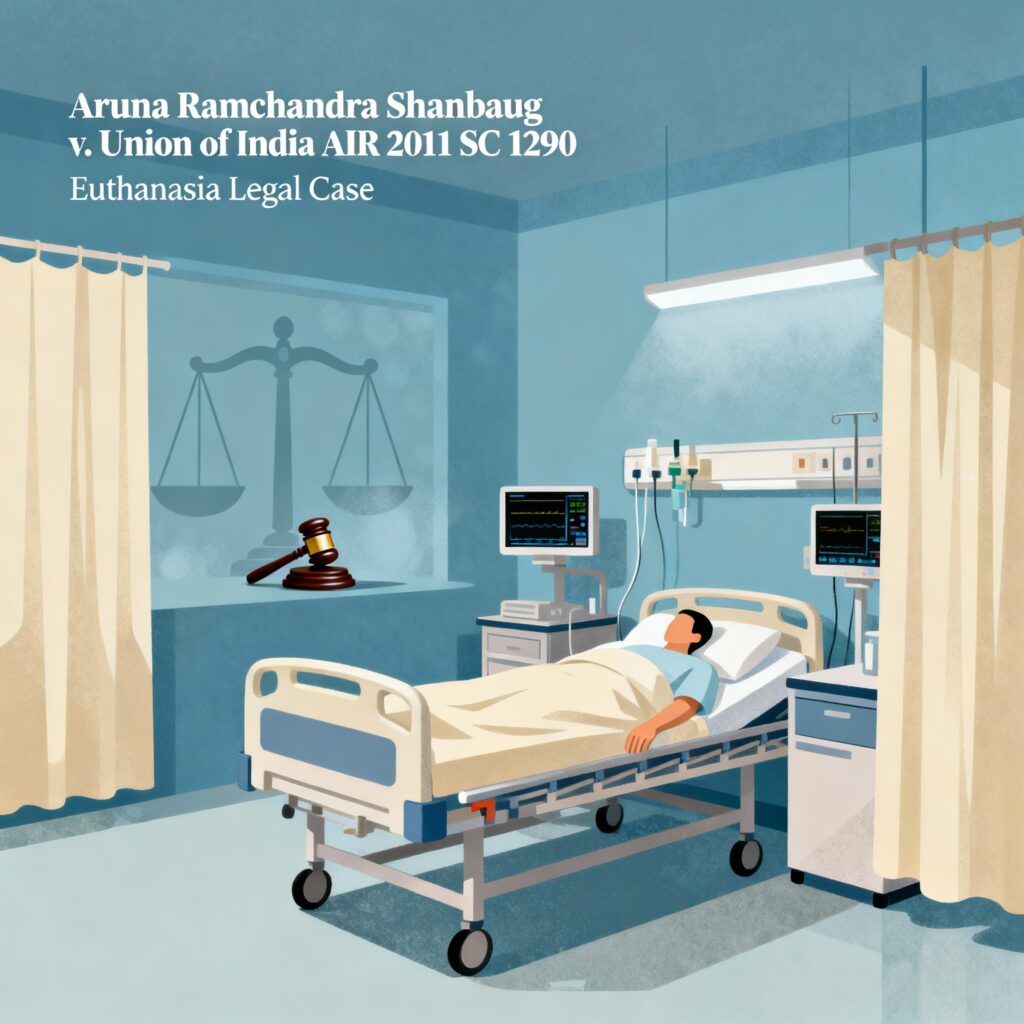Published on: 09th November 2025
Authored by: Shreyas Rastogi
ICFAI University Dehradun
Abstract
The landmark decision in Maneka Gandhi v. Union of India transformed the landscape of Indian constitutional law by liberating Article 21 from the narrow confines set in A.K. Gopalan v. State of Madras. The Supreme Court reinterpreted “procedure established by law” to mean fair, just, and reasonable procedure — not merely any procedure enacted by legislation. This judgment fused Articles 14, 19, and 21 into a cohesive trinity of fundamental rights, asserting that a law depriving personal liberty must pass the tests of equality, reasonableness, and non-arbitrariness. The Court pronounced, “No article in Part III is an island,” thereby ushering in an era of expansive rights jurisprudence.
“The principle of reasonableness, which legally as well as philosophically, is an essential element of equality or non-arbitrariness pervades Article 14 like a brooding omnipresence.” — Justice Bhagwati
Keywords
Fundamental Rights, Personal Liberty, Procedure Established by Law, Due Process, Article 21, Reasonableness, Passport Act, Judicial Review, Non-Arbitrariness, Constitutional Interpretation
Court: Supreme Court of India
Bench: 7-Judge Constitutional Bench
Judges: Justice M.H. Beg (CJI), Justice P.N. Bhagwati, Justice V.R. Krishna Iyer, Justice
Y.V. Chandrachud, Justice N.L. Untwalia, Justice S. Murtaza Fazal Ali, and Justice P.S.
Kailasam
Petitioner: Maneka Gandhi
Respondent: Union of India
Relevant Statutes and Precedents
- Constitution of India – Articles 14, 19(1)(a), 19(1)(g), 21
- Passports Act, 1967 – Section 10(3)(c), Section 10(5)
- K. Gopalan v. State of Madras AIR 1950 SC 27
- Satwant Singh Sawhney v. D Ramarathnam (1967) 3 SCR 525
Facts of the Case
In July 1977, Maneka Gandhi, a journalist and public intellectual, was issued a passport under the Passports Act, 1967. Shortly thereafter, on July 2, 1977, she received an official communication from the Regional Passport Officer, New Delhi, stating that her passport was being impounded in public interest under Section 10(3)(c) of the Act. The communication directed her to surrender her passport within seven days, without furnishing any reason for the impounding order.
Alarmed by the unexplained restriction on her liberty, the petitioner wrote to the authorities demanding the grounds for such action. However, her request for reasons remained unanswered. The silence of the State in such a sensitive matter involving her freedom of movement and reputation compelled her to approach the Supreme Court of India under Article 32, alleging a violation of her fundamental rights under Articles 14, 19(1)(a), 19(1)(g), and 21.
The Union of India, in its reply affidavit, justified the impounding of the passport citing vague concerns of national security and public interest. However, it refused to disclose the precise grounds, invoking privilege under Section 10(5) of the Passports Act, 1967, which permits the government to withhold reasons when public interest demands confidentiality.
This situation raised constitutional questions regarding the scope of personal liberty, the limits of State discretion, and the procedural safeguards that must be observed when restricting a citizen’s right to travel abroad.
Issues Involved
- Whether the right to travel abroad is protected under Article 21 as part of “personal liberty”?
- Whether Section 10(3)(c) of the Passports Act, 1967 violates Articles 14, 19, and 21 of the Constitution?
- Can a law prescribing procedure under Article 21 be arbitrary or unfair and still be valid?
- Is prior hearing mandatory before impounding a passport?
Arguments by the Petitioner
The petitioner, Maneka Gandhi, challenged the impounding of her passport by the Government of India under Section 10(3)(c) of the Passports Act, 1967, claiming it violated her fundamental rights guaranteed by the Constitution.
- The petitioner argued that the right to travel abroad is a facet of personal liberty protected under Article 21 of the Constitution. Therefore, no person can be deprived of this liberty except by a “procedure established by law”, which must be just, fair, and reasonable, and not arbitrary, fanciful, or oppressive.
“If the right to go abroad is part of personal liberty, it cannot be curtailed except according to fair and reasonable procedure” – Petitioner’s plea (para 10).
- It was contended that Section 10(3)(c) of the Passports Act is vague, arbitrary, and overly broad, giving uncanalised discretion to the executive. It does not provide any objective standard or procedural safeguards and hence violates Article 14 (right to equality) and Article 21.
The petitioner emphasized that the phrase “in the interests of the general public” is ambiguous and susceptible to misuse unless narrowly interpreted.
- The petitioner contended that no prior notice or opportunity of hearing was provided before her passport was impounded. This denial of audi alteram partem (hear the other side) violated the principles of natural justice, rendering the decision procedurally unfair.
“The impugned order was passed behind her back and no reasons were given… This offends the basic tenets of fairness in action.” (para 13)
- Heavy reliance was placed on Satwant Singh Sawhney v. D Ramarathnam [(1967) 3 SCR 525], where the Supreme Court held that the expression “personal liberty” includes the right to travel abroad. The petitioner submitted that this right cannot be curtailed without due process and proper legal safeguards.
- It was argued that the interpretation of “procedure established by law” must not be narrow or mechanical. Instead, it must incorporate the due process doctrine, similar to American constitutional jurisprudence, ensuring both substantive and procedural fairness.
Arguments by the Respondent
The Union of India, represented by the Attorney General, defended the impounding of Maneka Gandhi’s passport as an action undertaken “in the interest of the general public” under Section 10(3)(c) of the Passports Act, 1967. The following core arguments were advanced:
- The respondents maintained that the impounding was based on compelling considerations of national interest and public good, though the exact nature of the reasons could not be disclosed. They invoked Section 10(5) of the Act, which exempts the government from furnishing reasons if it believes it would not be in the public interest to do so.
“Disclosure of the grounds would be prejudicial to the interests of the general public.” – Union of India (para 20).
- The State contended that Article 21 of the Constitution requires only that there be a “procedure established by law.” The procedure laid down under the Passports Act was followed in this case. Therefore, there was no violation of the petitioner’s right to personal liberty.
- It was argued that in urgent or sensitive matters such as national security, a prior hearing is not mandatory, and post-decisional remedies may suffice. The Union claimed that natural justice is not a rigid doctrine and must yield to the demands of practical governance and security.
“Observance of natural justice is not an inflexible rule; it must vary with circumstances.” – AG’s submission (para 25).
- The State defended the provision’s validity, asserting that the phrase “in the interests of the general public” is constitutionally sound and cannot be struck down merely because it confers discretion. The discretion, they argued, is exercised with accountability and under legal framework.
- The respondent also questioned whether the right to travel abroad is a part of personal liberty under Article 21 at all. Even if it were, such a right must be subject to reasonable restrictions imposed by a valid law.
Judgment / Verdict
The Supreme Court delivered a landmark and unanimous judgment, expanding the interpretation of Article 21 and redefining the scope of personal liberty in Indian constitutional law.
- The Court held that the right to travel abroad is an essential component of personal liberty under Article 21, and any restriction on it must satisfy the constitutional mandate of fair, just, and reasonable procedure.
“The ambit of personal liberty is the widest and it covers a variety of rights which go to constitute the personal liberty of man.” — Justice P.N. Bhagwati
- The Court gave Article 21 a transformative interpretation, holding that “procedure established by law” cannot be understood as any procedure enacted by the legislature. It must meet the test of non-arbitrariness, reasonableness, and fairness — effectively introducing American-style due process into Indian jurisprudence.
“No procedure which is not ‘right, just and fair’ can be said to be ‘procedure established by law’.” — Justice Bhagwati
- While upholding the constitutionality of Section 10(3)(c) of the Passports Act, the
Court ruled that it must be interpreted harmoniously with Articles 14, 19, and 21. The provision should be read to imply the obligation of a hearing, at least post-decisional, thus preserving natural justice.
- The Court repudiated the narrow and compartmentalized approach taken in K. Gopalan v. State of Madras, where each fundamental right was treated as isolated. Instead, the Court held that Articles 14, 19, and 21 are not mutually exclusive but form a unified code for protection of liberty.
“The law must therefore now be taken to be well settled that Article 21 does not exclude Article 19, and that even if there is a law prescribing a procedure for depriving a person of ‘personal liberty’, and there is no infringement of the fundamental right conferred by Article 21, such law… must also satisfy the requirements of Article 19.” — Justice Bhagwati
- The judgment comprised multiple concurring opinions, each elaborating on facets of liberty and constitutional fairness:
○ Justice P.N. Bhagwati: Delivered the leading opinion, stressing a liberal, dynamic, and interconnected interpretation of fundamental rights.
○ Justice V.R. Krishna Iyer: Emphasized that natural justice is not a mere rule of law but a constitutional requirement embedded in Article 21.
“Law is not a brooding omnipresence in the sky but a pragmatic instrument of social order.” — Justice Krishna Iyer
○ Chief Justice M.H. Beg: While concurring with procedural safeguards, he deferred to executive authority in matters involving national interest.
○ Justice Y.V. Chandrachud: Supported post-decisional hearing in cases requiring administrative urgency, emphasizing that natural justice is flexible.
Analysis
The Maneka Gandhi judgment broadened the meaning of personal liberty and reiterated that laws cannot be arbitrary.
Key analytical points:
- Demise of Gopalan doctrine: The case rejected the prior view that each fundamental right operates in isolation. It confirmed that laws under Article 21 must also satisfy Articles 14 and 19.
- Natural Justice: Emphasized procedural safeguards — particularly the right to be heard — as integral to constitutional protection.
- Constitutional Integration: Justice Bhagwati introduced the doctrine of “mutual interdependence” of fundamental rights, declaring that no right can be interpreted in isolation.
- Rights as Inalienable: The judgment recognized that fundamental rights are derived from the dignity of the individual and cannot be subjected to arbitrary restraint.
- Post-Emergency Context: This case, delivered soon after the 1975 Emergency, restored faith in individual freedoms, limited executive power, and reasserted the role of judicial review as a bulwark of liberty.
Justice Krishna Iyer’s concurring opinion added:
“No article in Part III is an island. The conclusion is irresistible that Article
21, though couched in negative language, is a reservoir of all human rights.”
Ratio Decidendi
- Article 21 includes not just the existence of a procedure but mandates that it be fair, just, and reasonable.
- Laws infringing personal liberty must be tested on Articles 14, 19, and 21
- Section 10(3)(c) of the Passports Act is constitutional if interpreted in a manner that includes post-decisional hearing.
- There exists a positive duty on the State to ensure that rights are not restricted arbitrarily.
- Fundamental rights form an indivisible code and must be read holistically.
Obiter Dicta
- The right to travel abroad is part of the broader spectrum of liberty.
- Natural justice is not a rule of thumb but a constitutional command.
- “Law which is arbitrary or unreasonable, is no law at all.”
- “A fundamental right is not a gift from the State to its citizens, but a recognition of rights that are inherent in every individual.”
- Executive decisions must be open to judicial scrutiny, especially when personal liberty is at stake.
Final Decision
The Supreme Court ruled in favour of Maneka Gandhi, declaring that any law affecting personal liberty must be reasonable, non-arbitrary, and subject to procedural safeguards.
The impounding of her passport without furnishing reasons or offering an opportunity to be heard was held to be constitutionally impermissible. However, the provision was not struck down — it was read down to conform with fundamental rights.
The Court directed that the petitioner be granted a post-decisional hearing and reiterated the primacy of individual liberty in Indian democracy.
This case revolutionised Indian jurisprudence by:
- Re-defining “procedure established by law”.
- Embedding natural justice in constitutional interpretation.
- Creating a triadic test under Articles 14, 19, and 21.
- Establishing a rights-expanding precedent for future constitutional interpretation.




